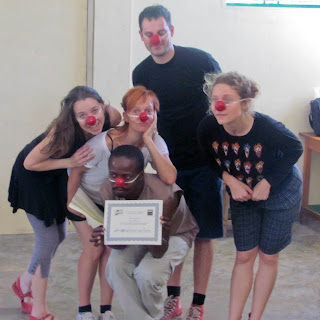For this project, Clowns Without Borders partnered with War Child Canada in Haiti where WCC has been working since February 2010, focusing on child protection and gender based violence. WCC doesn't work directly in the field but through local partners and community projects. Their staff is composed of technicians, trainers, and psychologists and everyone is Haitien except for one french employee and one employee from Sierra Léon.
There is not a strong hummanitarian culture of protection work in Haiti and few funds are alloted towards protection work.
In Port au Prince, WCC works in the neigborhood of Carrefour Feuille with 5 Youth Clubs (Cleaced, JEZI, Ajevich, GEM, and EKT) and with a local organization called APROSIFA which has 4 centers. In Jacmel, WCC works with 3 Child Safe Centers (in Cayes Jacmel, Marigo, and Coq Chanté) and with a local organization which focuses on sexual and gender based violence called Femmes Décidés.
We are four clowns: Béné (French), Jeff (American), Marykristn (Quebecquoise), and myself, Selena (American, living in france). We begin our collaboration with WCC by going to Jacmel to tour our show with just the four of us clowns as a way to introduce our work. We perform for children from the 3 centers and we do a performance for an adult audience of mostly women at a sensibilisation event organized by Femmes Décidés. Perhaps Clowns Without Borders will return to Jacmel for a residency another time.

We also perform our show upon our return to Port au Prince at the lunch break on our first day of trainings. It serves as an introduction in clown, both to the group of 24 activity leaders we are training and to the community where we are in residency for 7 days.
War Child Canada has invited Clowns Without Borders to Port of Prince to train members of the youth clubs who teach activities in their communities. WCC wants out training to give these activity leaders skills to have fun with the children they are teaching. These activity leaders are volunteers and will be intervening 1-2 hrs a week, or up to 4 hrs a week depending on their availability and commitement. WCC wants to bring something new, special, and different to the communities via their project with Clowns Without Borders. Their director tells us they are proud to be bringing something new.
Our training is over the course of 7 days with 24 activity leaders, 4 from each of the 5 youth clubs and 4 from APROSIFA. These activity leaders were chosen by their respective youth clubs after a big meeting explaining the project with photos and video of past Clowns Without Borders work in Haiti.
Parallel to this morning training we lead afternoon workshops with 20 children (4 from each of the youth clubs) assisted by 4 activity leaders (1 from each of the youth clubs). These 4 activity leaders are also part of our morning group. In addition to having an all day schedule like us, they are responsible for picking up the 4 kids from their center at lunchtime and bringing them home at the end of the day.
At the end of our residency we will create a show with these 20 children and 4 activity leadersand tour the show in the neighborhoods of the different youth clubs.









































